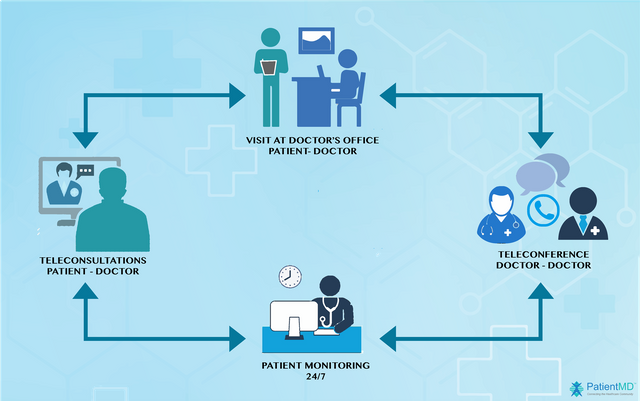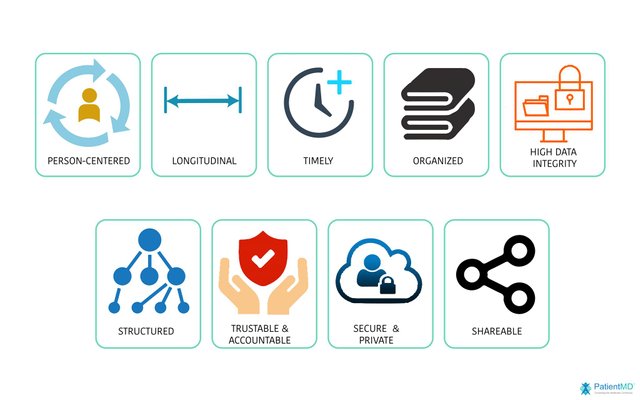Significance of Blockchain technology in Healthcare

The digitized ledger wherein all the cryptocurrency transactions are maintained is a blockchain. It is a decentralized system where the recent transactions are recorded and added in a chronological manner. Market participants can keep a track of the digital currency transactions through this system without the help of central recording. This was originally developed as the method of storing the transactions of Bitcoin. Such a technology is mainly used so that transactions can be verified later. Such a technology ensures that record cannot be changed and the authenticity can be checked by the entire community.
Now when we break the term, we have ‘block' and ‘chain'. Block is the current part of a blockchain where all of the recent transactions are recorded. Once the transactions are recorded, the block goes into the ‘chain' where all other transactions are recorded. All the blocks are connected to one another within the blockchain. After a block gets completed then another block is created and the completed block gets added with the help of cryptography so that they are meddle-proof. The data entered can be distributed but you cannot copy them.
Some of the key characteristics of blockchain that makes it different are:
- Distributed and synchronized across networks which is suitable for multiorganizational business networks.
- Data cannot be mutilated as they are stored as smart contracts which ultimately gives confidence about the safety of information.
- The transactions must be valid and there is also a need to be an agreement between the related parties. This agreement will ensure that there are no inaccurate or fraudulent transactions in the database.
- Immutable data: once the data is entered, it cannot be changed or altered in any form.
When all of such characteristics are combined, it definitely gives the organization or individual a high degree trust in the data and the network. Now given the benefits and the characteristics, any sector will be benefited from adopting this technology. Likewise, the healthcare industry can obtain huge benefits if they adopt this technology. Like any other industry, the healthcare industry is not free from limitations.
Some of the limitations are:
- One of the major problems of the healthcare industry is the use of different data formats to store data. This process ultimately makes it difficult to share data with other professionals in the same field. Therefore, when a patient visits a new professional, he will not be able to access the patient's medical history.
- Without medical history, a professional will have to conduct tests that might have been done before. It will also increase the cost involved for both the patient and the healthcare institutions. Blockchain technology will help in such cases as the professional will have to be a part of the network to access the patient's information.
The benefit to the insurers:
With the introduction of blockchain a level of transparency can be obtained which is not present in the insurance world. A number of middlemen exist throughout the life cycle of health insurance policy. It takes forever for the cycle to go to the other end from one end since information passes through a number of stakeholders. Such inefficiencies can be reduced with the introduction of the blockchain.
For example, patients will be able to enter into contractual agreements with the physicians, hospitals, and the pharmaceutical companies. A ‘block' will take up all the necessary information that will be added to the chain. The technology will ensure that the parties can only avail of the information based on the agreement. Now when a transaction is executed, everyone involved in the contract is able to view the status and the process along with the history. Introduction of blockchain technology is becoming a valuable proposition due to the peer-to-peer freedom and privacy.
Health insurance companies are incorporating blockchain so that growth and market share can be accelerated. Insurers are keeping a note on the long-term benefits while keeping the focus on short-term vigilance. They will be able to target specific needs instead of using the method of one-size-fits-all with the use of digital transformation platforms. However, targeting a right investment requires the building of an experienced team.

The main promise of blockchain in healthcare is the application of a method that is user-friendly and user-oriented to store data such as patient records and prescription scripts. Let's note the ways in which healthcare will be beneficial.
- Better management of patient data thereby improving the integrity and security. PatientMD platform aims to use blockchain technology which is by far the most secure technology, to manage its patients data.
- Reduction in compliance and regulatory costs.
- Better storage of clinical trial records that helps in the development of new drug. Blockchain will ensure speed in the transfer of data of such clinical trials.
- Setting up of new standards and practices
- Enhance interactions between insurers, policyholders and healthcare professionals
- Developing partnerships with leading ventures
- Ease with drug supply chain management as all the information and data related to the drugs will be stored in the distributed ledger. It will be possible to know the details of every drug within a few minutes.
Even with a number of benefits, the blockchain technology is not free from potential risks. Challenges that may come up:
The developments in technology in healthcare is slow and some of it is due to the possible consequences of failure. However, most of the risks can be avoided with the right support and guidance.
There is a definite need of developers with blockchain expertise. Most healthcare professionals do not understand the way in which this technology works.
The healthcare data is of prime target of the hackers. Therefore, it forces health insurers to apply only that technology that is proven before wasting any time in building their own. This problem might be solved with the distributed digital data storage. The only people who will be able to access the data are those who are linked with a certain block of the blockchain.
The healthcare institutions and professionals will have to keep executing blockchain technology into their operation before it can be applied fully. Such a process will ensure that the people will get accustomed to the way in which blockchain works. Thus, a smooth transition from the traditional method will become possible.
Conclusion:
The healthcare industry in the United States is comprised of interconnected entities. All of these entities have information systems that comprise of data and records. Therefore, the cost associated with the healthcare system is increasing day by day wherein administrative cost forms a major part. When we consider the capabilities of blockchain technology, it can be believed that the blockchain technology has the potential to be the next big innovation engine. Many of the challenges faced by the healthcare industry can be eased with the application of this technology.
I will be featuring it in my weekly #technology and #science curation post for the @minnowsupport project and the Tech Bloggers' Guild! The Tech Bloggers' Guild is a new group of Steem bloggers and content creators looking to improve the overall quality of our niche.
Wish not to be featured in the curation post this Friday? Please let me know. In the meantime, keep up the hard work, and I hope to see you at the Tech Bloggers' Guild!
If you have a free witness vote and like what I am doing for the Steem blockchain it would be an honor to have your vote for my witness server. Either click this SteemConnect link or head over to steemit.com/~witnesses and enter my username it the box at the bottom.